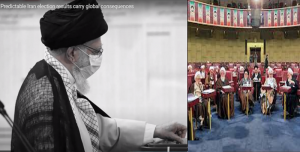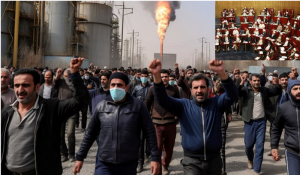(Video) Predictable Iran Election Results Carry Global Consequences
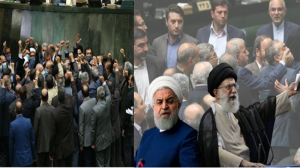
The Iranian regime has been preparing itself for what they call the parliamentary elections and the Assembly of Experts elections. The outcome of the forthcoming sham elections scheduled for March 1 is more predictable than their global repercussions.
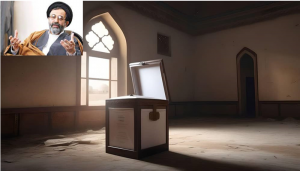
In October 2023, former Minister of Interior Abdolvahed Mousavi Lari stated in an interview, “There is fear that people’s anger towards the ballot boxes may be more serious than in 2019.” marking the lowest participation rate in parliamentary elections since 1979.
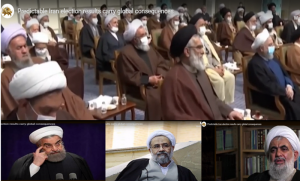
Hundreds of candidates, including dozens of sitting parliament members, were disqualified from the parliamentary elections. Disqualified candidates for the elections of the Assembly of Experts include notable figures such as three former intelligence ministers.
The clerical regime is approaching the elections amidst broad societal disenchantment. Officials anticipate high election boycotts compared to any other year.
Unlike previous years, few anticipate any meaningful change stemming from the electoral show. Yet, significant questions linger:
• In a system devoid of genuine voting, why does Ali Khamenei, the Supreme Leader of Iran, persist in holding them?
• Despite Khamenei’s push for high voter turnout, why has he eliminated trusted confidants and accomplices with extensive political and security backgrounds, potentially increasing the likelihood of election boycotts?
• What implications does the disqualification of Hassan Rouhani carry?
• Is Khamenei’s current strategy motivated primarily by considerations for his successor or his own survival?
• What does the elimination of Khamenei’s rivals mean for a Western policy that is geared toward engaging so-called moderates in the regime?
Unprecedented election boycott
The clerical regime is approaching the elections amidst broad societal disenchantment. Officials and state media anticipate record-high election boycotts compared to any other year.
In October 2023, former Minister of Interior Abdolvahed Mousavi Lari stated in an interview, “There is fear that people’s anger towards the ballot boxes may be more serious than in 2019.”
In 2019, the then–Minister of Interior announced a voter turnout of 42.57% for the eleventh parliamentary elections, marking the lowest participation rate in parliamentary elections since the mullahs rose to power in 1979.
The Arman-e Melli newspaper reported, “The results of a survey conducted through direct interviews with individuals in Tehran reveal interesting findings.
This survey was conducted on June 11 in 32 high-traffic areas of Tehran city, with 365 individuals aged over 18. According to this survey, 58% of respondents are unaware of the upcoming elections by the end of this year, while only 42% are informed about the matter. Additionally, the opinion polling group of the Roozplus news agency stated in its first phase of polling regarding the twelfth parliamentary elections on August 9: ‘35% of people definitely will not participate in the elections, and only 8% will vote based on the lists.’”
The state-run website, Fararu, stated on January 30, “People have come to believe that conscientious non-participation in elections is better than voting for someone we are sure cannot solve our problems. Boycotting the ballot box is a serious phenomenon, and those who have undermined the credibility of the elections must be held accountable.”
Major disqualifications of security veterans
Hundreds of candidates, including dozens of sitting parliament members, were disqualified from the parliamentary elections. Disqualified candidates for the elections of the Assembly of Experts include notable figures such as three former intelligence ministers:
Ali Fallahian, Mahmoud Alavi, and Heydar Moslehi as well as Hossein Taeb, the former head of the Revolutionary Guards’ Intelligence Organization. However, the most prominent person to be eliminated from the race is Hassan Rouhani, a two-term president and 24-year member of the Assembly of Experts.
Before his disqualification on January 25, Rouhani had repeatedly warned before his nomination for the new term that the removal of various candidates would undoubtedly lead to people becoming disillusioned with participating in the elections. These warnings did not go unnoticed by the ruling clique close to Khamenei.
On January 17, forewarning against his disqualification, Rouhani said, “This is the first time I see a ruling minority having a similar view, like the majority of the people. The ruling minority wants the elections to be quiet, so that no one goes to the ballot box, and this is what the majority of people want too. The counter-revolutionary forces also want it to be quiet. Each of them sees it from their own perspective. The ruling minority sees their survival in the quietness of the ballot box. If the ballot box becomes crowded, they will lose.”
Two weeks before Rouhani’s disqualification, the Javan newspaper wrote, “Rouhani is running as a candidate for the Assembly of Experts, and he believes it’s highly likely that in the forthcoming assembly, the experts will face a pivotal and challenging decision. He has openly expressed this perspective. Though he didn’t foresee the possibility of his own absence at that critical decision-making juncture.”
“Critical juncture” is a reference to the decision regarding the regime’s next leader as Khamenei is 84 years old and questions about his successor are already being hotly debated.
On January 27, the state-run newspaper Ham-Mihan also published an analysis regarding Rouhani’s disqualification under the title “Purification of the Assembly of Experts.” It referenced Rafsanjani’s pivotal role in appointing Khamenei as the successor of regime founder Ruhollah Khomeini in 1989 and his role in imposing Rouhani’s presidency on Khamenei in 2013, stating, “They sought to block Rouhani’s path to repeat what Hashemi Rafsanjani did in 1989
Though can he play the role Rafsanjani did in 2013?”
In December 2015, Ahmad Khatami, initially a member and now a part of the Assembly of Experts’ presidium due to his proximity to Khamenei, discussed the Assembly’s role in selecting the next leader. He outlined the formation of a committee comprising “prominent and knowledgeable individuals,” emphasizing that their task is not to directly select the leader but to “identify those within the leadership sphere.”
He underscored that “the committee, with utmost confidentiality, conducts this process, and if necessary, these names will only be presented to the leader.”
The confidentiality surrounding this process meant that 85 out of 88 Assembly of Experts members were unaware of it. This underscores the sensitivity and gravity of the succession crisis within the regime and sheds light on the purging ahead of the March 1 elections.
With Rouhani’s disqualification, he joins the ranks of previous marginalized presidents, including Ali-Akbar Hashemi Rafsanjani, Mohammad Khatami, and Mahmoud Ahmadinejad. This represents a significant setback not only for the concept of elections and parliamentary representation but also undermines the credibility of a key element of the regime’s authority, notably the presidency.
Moreover, the removal of top security officials suggests underlying internal crises and reveals Khamenei’s strategic calculations. Over the past 35 years, he has been the linchpin in preserving the regime and now demonstrates an unwavering commitment to survival, leaving no margin for error or experimentation in survival mode.
The consequences of these removals are now vivid within the ruling system.
Political backlash
On January 29, the Ham-Mihan newspaper wrote, “The announcement of the confirmation of qualifications reveals that the sixth round of Assembly of Experts elections is the least competitive compared to previous rounds. With four individuals qualified from North Khorasan province alone, there will be no competition for the elections in a total of 10 provinces. Presently, on average, only one and a half individuals are competing for each seat.”
Dideban Iran website reported, “While 138 individuals are competing for the sixth round of the Assembly of Experts elections, 11 seats out of the 88 seats of the Assembly of Experts, which belong to five provinces including Semnan, Alborz, Lorestan, Yazd, and South Khorasan, have no competitors. Also, in the fifth round of the Assembly of Experts elections, the number of qualified candidates was 188, which has decreased compared to this round.”
Rasoul Montajebnia, the Secretary-General of the Islamic Republic Party of Iran, said, “The disqualifications will likely deter the small percentage of individuals interested in participating; it could be deliberate to discourage voter turnout and diminish competition at the polls.”
Ahmad Zeydabadi, a state-affiliated analyst, mentioned in an interview with Didar News on January 24, “If this situation does not change, it is fundamentally a very, very dangerous downhill slide, which I think all those who are finally working in various fields have been ringing alarm bells for a long time.”
Khamenei’s Purpose Behind Holding Elections
Iran’s regime is grappling with a web of interconnected and intricate crises, each with the potential to profoundly impact the others, thus threatening the regime’s stability. Since 2017, the regime has faced imminent collapse amid numerous popular uprisings, managing to survive primarily through harsh repression and lack of international accountability.
Economic and social turmoil, coupled with longstanding political grievances, have heightened concerns among the ruling elite about the possibility of a major upheaval. Additionally, Tehran perceives regional and global isolation as a significant menace that could exacerbate domestic unrest and dampen the morale of regime forces.
To navigate these crises, Khamenei relies heavily on the armed forces and a shrinking circle of loyal officials who dutifully execute his commands without hesitation. Operating on a precarious precipice, the regime cannot afford any missteps or criticism.
Following the October 7 attacks and the war in Gaza, most former and current regime officials initially supported Tehran-backed militias. However, as the focus gradually shifted toward the role of the regime as the primary instigator of the crisis. The unity among regime officials swiftly eroded and dissenting voices emerged.
To advance his policies through Ebrahim Raisi’s government, Khamenei can no longer tolerate hindrances by the legislative branch, which he tightly vetted in 2020. Additionally, he must meticulously arrange the power dynamics well in advance for the Assembly of Experts, which is expected to select his successor.
To accomplish this strategic engineering, he aims to leverage a high turnout in elections as evidence of his social might, enabling him to maintain balance within the system and project strength internationally.
Ten months ago, on April 4, 2023, Khamenei said, “These elections at the end of the year are very important. Elections can be a manifestation of national strength. If the elections are not conducted properly, it indicates the weakness of the country, the weakness of the nation, the weakness of the government, the weakness of the officials, and the weakness of the people.”
To subscribe weekly Newsletter of NCRI, please use this link. https://bit.ly/3SMgEla
On January 22, the Islamic Revolutionary Guards Corps (IRGC)-run newspaper Javan wrote, “The main significance of elections lies in ensuring security. We face sworn enemies and a potent force that controls the extent of public engagement, whether they are nearby or far away.”
On January 12, Khamenei’s representative in Mashhad Ahmad Alamolhoda stated, “The enemy’s goal is to discourage and spread negative propaganda to keep you at home, running your businesses, and staying wherever you are, but they want you to refrain from participating in the elections.
This is why we emphasize that even if our arsenal is ten times more potent than the current situation if the enemy believes that the people are not supportive of this regime, they won’t hesitate to launch a military attack and invade our country’s territory from dawn until noon.”
Conclusion.
In Iran’s ruling religious dictatorship, genuine partisanship and ideological divides that prioritize public interest are nonexistent. Instead, two factions with contrasting doctrines on preserving the regime have competed for power over the past few decades.
One faction, portraying itself as advocating for reformism and moderation, suggested that establishing relations with the United States and its allies could effectively suppress Iran’s Resistance movement and eliminate the possibility of regime change.
On the other hand, the opposing faction believed that the regime could only maintain power through regional conflict, domestic executions, crackdowns, and the targeted assassination of opponents. They viewed any engagement with the West as harmful to the regime’s survival.
The growing network of Iran’s Resistance both within and outside Iran, the increasingly intense popular uprisings, and the regime’s increasing international isolation have led Khamenei to believe that consolidating his regime and eliminating rivals and dissenters is crucial for survival.
The prolonged 2022 uprising, marked by ongoing clashes between the people and the regime’s security forces, underscored to Khamenei the imminent threat of regime change. Consequently, he is unwilling to risk loosening his grip on power at any cost.
To fortify his regime, Khamenei has escalated regional conflicts, expedited the nuclear program, increased executions, intensified anti-Resistance propaganda, and conducted show trials of Resistance leaders. These actions form part of Khamenei’s survival strategy.
Nonetheless, despite his efforts to purge his own ranks “for purity” to stave off the overthrow of his regime, Khamenei overlooks the very fact that his regime becomes weaker by the day, while the people and the Iranian Resistance become bolder and more determined.
To subscribe weekly Newsletter of NCRI, please use this link. https://bit.ly/3SMgEla
Shahin Gobadi
NCRI
+33 6 61 65 32 31
email us here
With Rouhani’s disqualification, he joins the ranks of previous marginalized presidents, Ali-Akbar Rafsanjani, Mohammad Khatami, and Mahmoud Ahmadinejad.
Legal Disclaimer:
EIN Presswire provides this news content "as is" without warranty of any kind. We do not accept any responsibility or liability for the accuracy, content, images, videos, licenses, completeness, legality, or reliability of the information contained in this article. If you have any complaints or copyright issues related to this article, kindly contact the author above.

